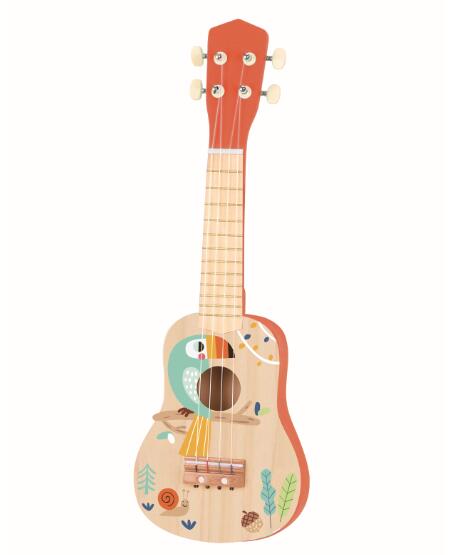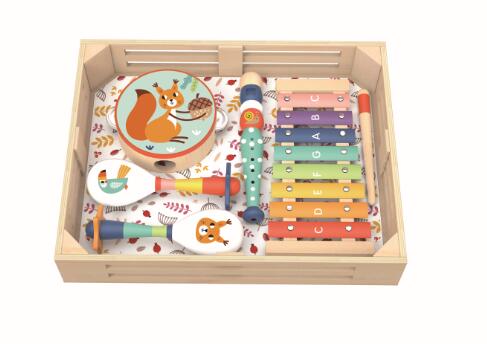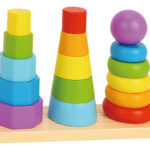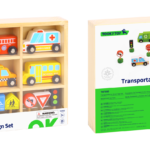“Music can touch us in a way that nothing else can. No better gift can we give to the children than to open this door for them.”
– Dr Montessori
Music is a universal language. It transcends geography, time, culture, and age. All of us like one kind of music or another other and so do children. Even if children don’t actively sing, you will find them softly humming a song they heard or moving to the rhythm of an instrument.

Benefits of Music to our kids
Apart from the joy we get from listening to or making music ourselves, music offers a host of benefits for young children.
Brain Development: Music has been shown to have a positive impact on brain development in children. Studies have found that exposure to music can help strengthen neural connections in the brain, which can improve language development, spatial reasoning, and other cognitive skills.
Emotional Regulation: Music can also be a powerful tool for emotional regulation. Listening to music can help children manage their emotions, and playing music can provide a healthy outlet for expressing feelings.
Socialization: Learning to play an instrument or sing in a choir can be a great way for children to socialize and develop important social skills. Participating in music classes or ensembles can teach children how to work together, communicate effectively, and support one another.
Cultural Awareness: Music can also help children develop an appreciation for different cultures and traditions. Exposure to different styles of music can broaden a child’s understanding of the world and help them develop empathy and respect for people from diverse backgrounds.
Creativity and Self-expression: Finally, music can be a wonderful outlet for creativity and self-expression. Playing an instrument, writing a song, or improvising on an instrument can all be ways for children to explore their creativity and express themselves in unique and meaningful ways.

How to categorize the age of musical toys
When you buy toys in a baby shop or Toy’s R US for example, choosing the most suitable toys for different ages of kids is very important. The age of a musical toy can be categorized in several ways, depending on the context and purpose of the categorization. Here are a few possible approaches:
Age range: One way to categorize musical toys by age is to use broad age ranges, such as infant, toddler, preschool, elementary, and so on. This approach is often used by toy manufacturers and retailers to help parents and caregivers select appropriate toys for children of different ages.
Developmental stage: Another way to categorize musical toys by age is to consider the developmental stage of the child, such as sensory exploration, cause-and-effect learning, or creative expression. This approach takes into account the child’s cognitive, motor, and social-emotional development and helps select toys that support their growth and learning.
Musical skill level: A third way to categorize musical toys by age is to consider the child’s musical skill level, such as beginner, intermediate, or advanced. This approach is often used by music teachers and educators to select toys that match the child’s level of musical ability and challenge them appropriately.
Toy features: Finally, musical toys can also be categorized by the features they offer, such as simplicity, complexity, interactivity, portability, and durability. This approach considers the child’s preferences, interests, needs, and the practical aspects of using the toy in different settings and situations.

For every young child, music has power and meaning beyond words. First, and most important, sharing music with young children is simply one more way to give love and receive love. Music and music experiences also support the formation of meaningful brain connections that are being established over the first three years of life ‘
Carlton, E.B. 2000. Learning through music: The support of brain research. Child Care Exchange 133 (May/June): 53–56.
Ways to enrich a child’s life with music
There is a lot more we can do with young children than just play rhymes off the internet. Here are some ways to enrich your child’s life with music.
Prenatal experiences
Musical experiences can begin from the womb from around 7 months in-utero as that is when the hearing begins to develop. We can play harmonious and gentle tunes and songs for our baby always making sure the music is at a reasonable volume. We can also sing softly to the baby and even play musical instruments. Choosing one song that is played repeatedly when the baby is in utero can also serve as a source of comfort for the baby once they are born as this creates a point of reference to the womb.
Infancy and toddlerhood
After babies are born and as they grow towards being toddlers, there are many ways in which we can provide them with rich musical experiences.
Music Appreciation
The first step in making music is listening and appreciating music – irrespective of the genre or culture. Early exposure to different genres of music, various styles, composers, languages, and instruments builds a strong foundation for music appreciation in the young child. You can do this by carefully choosing a diverse range of music and intentionally setting aside time to play them for young babies or toddlers – you don’t really need to explain too much at this time, just let the absorbent mind take it all in. As you notice your child beginning to develop a preference for a certain kind of music, you can go further in-depth into that genre but also continue exposing them to other genres. This can be done just for 10 – 15 minutes a day when the entire family can gather and listen to music together.
Musical instruments
Apart from offering a variety of listening experiences, young children can be introduced to percussion instruments like maracas, tambourines, triangles, bells, shakers, and the xylophone. A small-sized drum that can be either played with the hands or mallets can also be introduced. These can be displayed on the child’s shelf, just like any other material. When the child shows an interest in the instrument, the adult can demonstrate how to play it. The instrument also is introduced while listening to music or singing songs with the child.

Movement
The movement goes hand in hand with music. You may notice your baby or toddler swaying to the music you play or making movements while singing – encourage this and join in with them. Always provide space for moving in a safe manner. You could also use simple tools like a scarf or ribbon to wave around with the music that they are making or singing too. You can also play and sing songs with action and finger play to encourage your child’s sensitive period for movement.
Singing
Don’t be afraid to sing to your child and with your child even if you don’t believe that you can sing. Children are very forgiving and non-judgemental. They enjoy the experience of singing with us and it is a great way to bond with them. When you sing to babies and toddlers, make sure to slow down the pace of the song and just do a few lines at a time. They may not sing with you immediately but they are certainly listening and absorbing everything in. Slowly they make sing a few of the words from the song or do some of the action.

Other activities
- You can all books about music, musical instruments, singers, and composers in the book corner or music corner.
- Take your children to live concerts so they can see the magic come alive – make sure to check with the organizers if children are allowed and always sit at the back or on the side so you can leave when your child begins to get restless.
- You can also introduce the names of instruments and musicians using photographs, miniatures, and nomenclature cards.
- Music can be woven into everyday routines and transitions – you can sing about getting ready to go out or taking a bath.
- Once your children know a few songs and can recognize some instruments, you can play games with them where you hum the music and they guess the name or they close their eyes and you play the instrument and they name it.
“We tend to think that the realm of music is the privileged area of some happy few. Experience has taught us, however, that if offered the right kind of education from a very early age onwards, anyone is capable of entering the realm of music. Not everyone has the talent to practice music at an artistic level or create new work, but everyone can reach a stage where they can enjoy it.”
The End of Tooky
Tooky is a leading 18 years wooden toy supplier based in China. Below are our main 7 values. If you are interested in importing wooden toys, feel free to CONTACT us.
1) Products-Over 500 fine-selected products + over 40 quarterly new launches.
2) Free customized designs-9 experienced product managers, will convert toys into with your brand characteristics
3) Customized package-4 packaging experts offer not only safe packages, but legal labeling for market access
4) Test report-Not sure of testing standards? You can leave the test with us till we get a final “pass” report as the market requires
5) Lifestyle pictures-Never feel helpless about marketing! Will offer you lifestyle pictures if you need
6) Short videos-Check with our sales for “Short Video Paid-Service & Discount Program”
7) Exclusivity program-After spending a tremendous amount of resources on marketing and advertising, we may see competitors sharing our fruits of labor by carrying very similar products. How to obtain some kind of protection? An “exclusivity program” needed to be put in place, check with our sales.
Any comments, pls contact me sales25@tookytoy.com









6 回复
I don’t think the title of your article matches the content lol. Just kidding, mainly because I had some doubts after reading the article.
Thank you for your sharing. I am worried that I lack creative ideas. It is your article that makes me full of hope. Thank you. But, I have a question, can you help me?
Your point of view caught my eye and was very interesting. Thanks. I have a question for you.
I don’t think the title of your article matches the content lol. Just kidding, mainly because I had some doubts after reading the article.
Thanks for sharing. I read many of your blog posts, cool, your blog is very good.
Can you be more specific about the content of your article? After reading it, I still have some doubts. Hope you can help me.